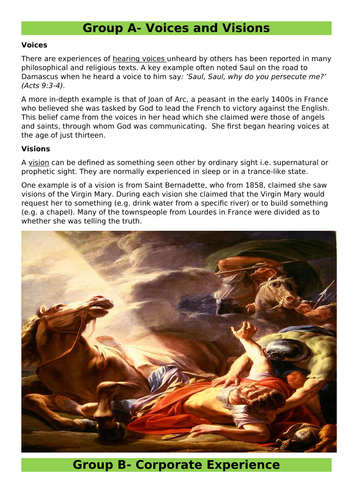




This contains a fully resourced, differentiated introductory lesson on religious experiences. The main part of the lesson involves students produce a spider diagram showing William James’s criteria for a religious experience, working in groups to complete a grid task showing its different types (i.e. mystical, corporate, conversion, visions and voices) and then link it back to William James’s classification scheme for analysis (how these examples meet some or all of his criteria), finishing off with a fun and innovative plenary.
Learning Objectives:
To describe the meaning of a religious experience.
To explain the various categories of religious experience.
To analyse whether they meet William James criteria for a religious experience.
Get this resource as part of a bundle and save up to 51%
A bundle is a package of resources grouped together to teach a particular topic, or a series of lessons, in one place.
OCR AS Philosophy Complete Syllabus
This contains a set of fully resourced, differentiated lessons to cover the entire OCR AS Philosophy syllabus. Theme 1 - Philosophical Language And Thought It was taught in the following order: 1. What Is Plato’s Analogy Of The Cave? 2. How Valid Is Plato’s Analogy Of The Cave? 3. What Is Plato’s Theory Of The Forms? 4. What Are Aristotle’s Four Causes? 5. What Is Aristotle’s Prime Mover? 6. How Did Plato Distinguish Between The Body And Soul? 7. How Did Aristotle Distinguish Between The Body And Soul? 8. How Did Descartes Distinguish Between The Mind And Soul? Theme 2 - The Existence Of God It was taught in the following order: 1. What Is The Teleological Argument? 2. How Can The Teleological Argument Be Challenged? 3. What Is The Cosmological Argument? 4. What Is The Ontological Argument? 5. Does The Ontological Argument Work? Theme 3 - God And The World It was taught in the following order: 1. What Are Religious Experiences? 2. Do Religious Experiences Prove The Existence of God? 3. How Can The Validity Of Religious Experiences Be Challenged? 4. How Is The Problem Of Evil A Challenge To The Existence Of God? 5. Does The Augustinian Theodicy Solve The Problem Of Evil? 6. Does The Irenaean Theodicy Solve The Problem Of Evil?
OCR AS Philosophy - God And The World (Theme 3)
This contains a set of fully resourced, differentiated lessons on religious experiences and the problem of evil to cover the OCR AS Philosophy specification for Theme 3 - God And The World. It was taught in the following order: 1. What Are Religious Experiences? 2. Do Religious Experiences Prove The Existence of God? 3. How Can The Validity Of Religious Experiences Be Challenged? 4. How Is The Problem Of Evil A Challenge To The Existence Of God? 5. Does The Augustinian Theodicy Solve The Problem Of Evil? 6. Does The Irenaean Theodicy Solve The Problem Of Evil?
Something went wrong, please try again later.
This resource hasn't been reviewed yet
To ensure quality for our reviews, only customers who have purchased this resource can review it
Report this resourceto let us know if it violates our terms and conditions.
Our customer service team will review your report and will be in touch.